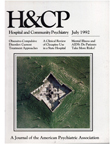Obsessive-Compulsive Disorder
Abstract
Obsessive-compulsive disorder is a well-defined clinical syndrome that has been difficult to treat with standard psychotherapies and medications. Data accumulated over the last decade have demonstrated that the disorder is relatively common and frequently coexists with phobia, depression, and alcohol abuse. The authors review current studies of the spectrum of obsessive-compulsive disorder and related disorders that respond to the new serotonergic antidepressants and behavioral therapy. Differential diagnosis, epidemiology and comorbidity, etiology, evaluation, and psychologic and pharmacologic treatments are discussed. Most patients with obsessive-compulsive disorder require long-term treatment with drugs, but behavioral therapy has also been used successfully. Serotonin reuptake inhibitors used in the treatment of depression have been found effective; clomipramine has produced the best results in large-scale tests. The fact that serotonin reuptake inhibitors are effective as both antidepressants and antiobsessional agents suggests common biological factors in disorders that respond to these drugs.
Access content
To read the fulltext, please use one of the options below to sign in or purchase access.- Personal login
- Institutional Login
- Sign in via OpenAthens
- Register for access
-
Please login/register if you wish to pair your device and check access availability.
Not a subscriber?
PsychiatryOnline subscription options offer access to the DSM-5 library, books, journals, CME, and patient resources. This all-in-one virtual library provides psychiatrists and mental health professionals with key resources for diagnosis, treatment, research, and professional development.
Need more help? PsychiatryOnline Customer Service may be reached by emailing [email protected] or by calling 800-368-5777 (in the U.S.) or 703-907-7322 (outside the U.S.).



